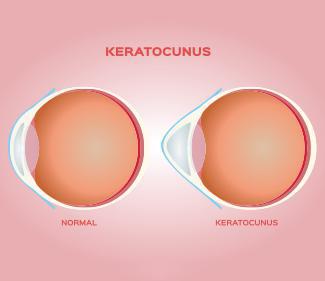What are my treatment options for keratoconus?
The team at VIP Laser Eye Center can treat keratoconus at any stage. The best time for treatment at VIP Laser Eye Center is as soon as you are diagnosed with keratoconus. We offer a revolutionary treatment called collagen cross-linking which can be performed at all stages of the disease, but works best in early keratoconus. The goal of collagen cross-linking is to prevent progression of keratoconus so your vision does not continue to worsen overtime. Collagen cross-linking is a minimally invasive procedure that involves frequent application of eye drops that contain Riboflavin, or Vitamin B2, followed by special UV light exposure for up to 30 minutes. Collagen cross-linking can prevent the need for surgical intervention such as a corneal transplant, which many severe keratoconus patients need in order to restore their vision.
Glasses and soft contact lenses may give you clear vision early in the disease, but may stop working as your keratoconus progresses. At this point, your doctor may recommend fitting you with a rigid gas permeable contact lens or a hard scleral lens.
Another option for visual rehabilitation your doctor may offer is called intracorneal ring segments called Intacs. Intacs are plastic rings that are inserted into the cornea with a laser to improve the shape and contour of your cornea. Depending on the stage of your disease, Intacs may improve your vision without glasses, with glasses, or allow you to more comfortably wear contacts again. Your doctor will tell you at your consultation whether you are a good candidate for Intacs.
If you have advanced keratoconus that is not amenable to other treatments, your doctor may recommend corneal transplant surgery. Please visit our corneal transplant page to learn more about this procedure.
To find out if keratoconus is causing your vision decline, call VIP Laser Eye Center today.



